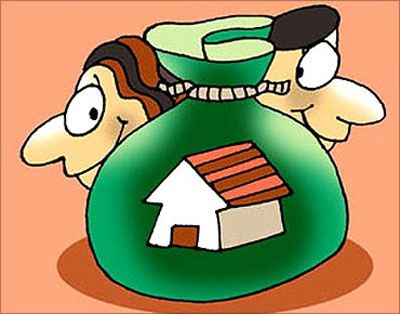
It has been announced for a year. If you borrow with spouse, this limit doesn’t come into picture
Finance Minister Arun Jaitley brought cheer to first-time home buyers by offering an additional deduction of Rs 50,000 on interest repayment under Section 80EE.
Homebuyers already enjoy a deduction of Rs 200,000 on interest repayment under Section 24 for a self-occupied property, and a deduction to the extent of Rs 150,000 on principal repaid under Section 80C.
This new benefit, however, comes with a number of limitations.
Depending on the tax bracket under which you fall, this new deduction will allow you to make tax savings in the range of Rs 5,150-Rs 15,450.
Next, let us examine the case of a person who takes a loan of Rs 35 lakh (Rs 3.5 million) at the rate of 9.5 per cent for a tenure of 15 years.
His equated monthly instalment comes to Rs 36,548.
His interest repayment in the first year comes to about Rs 328,000.
The total deduction he can claim on interest repayment is Rs 250,000 (combining sections 24 and 80EE).
Thus, he still can’t claim benefit on the entire interest amount repaid (in this case).
Moreover, he will be able to reap the benefit of Section 80EE only for nine years out of the tenure of 15 years. After nine years his interest repayment will fall below Rs 200,000, so the benefit will become redundant.
One option before this individual is to reduce the amount he borrows to Rs 27 lakh or Rs 2.7 million (instead of Rs 35 lakh or Rs 3.5 million), in which case his interest repaid from the first year will drop to around Rs 250,000.
The other option is to take a joint home loan along with his spouse.
Once he takes a joint home loan, however, Section 80EE does not come into the picture, according to a note from EY LLP.
The spouse’s Section 24 deduction alone will suffice to account for the entire interest repaid.
The proportion in which a joint home loan is taken is important.
“If the spouse in the higher tax bracket takes a higher proportion of the loan, the tax saving will be higher,” says Alok Agrawal, partner, Deloitte, Haskins and Sells.
Another point to remember about opting for a joint loan is that both partners should have their own incomes to pay the EMI, and both must be first-time buyers.
Section 80EE comes with pre-conditions. The loan must be sanctioned in financial year 2017.
This should be the buyer’s first purchase.
The cost of the property should not exceed Rs 50 lakh (Rs 5 million) and value of the loan should not exceed Rs 35 lakh.
“Due to restrictions around cost of property and value of loan, people living in bigger metros like Delhi and Mumbai will not be able to avail the benefit.
"It will be more beneficial for those in Tier-II cities and smaller towns,” says Ranjit Punja, chief executive officer, Creditmantri.com.
The Section 80EE benefit has been made available for only one year.
According to Vishal Dhawan, chief financial planner, Plan Ahead Wealth Advisors, “People living in major metros should examine the rent versus buy equation properly and not feel forced into buying a house in a hurry just because this additional benefit has become available for a year.”
Illustration by Uttam Ghosh/Rediff.com










